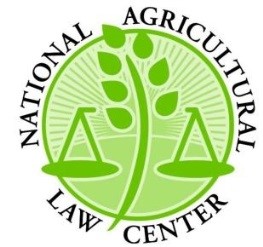A comprehensive summary of today’s judicial, legislative, and regulatory developments in agriculture and food. Email important additions to: camarigg at uark.edu
JUDICIAL: Includes environmental, AMS, nuisance and contract issues.
HARLAN D. DOUGLASS and MAXINE H. DOUGLASS, husband and wife, Appellants, v. SHAMROCK PAVING, INC., a Washington corporation, Respondent, No. 33615-8-III, 2016 WL 6988907 (Court of Appeals of Washington, Division 3 Nov. 29, 2016) concerned Washington’s Model Toxic Control Act. Defendants discharged petroleum on plaintiff’s property but refused to pay costs because quantities released were “too small to pose a potential threat to human health or the environment.” Trial court agreed with defendant and plaintiffs appealed. Appellate court considered the “scope of what constitutes remedial action under the MTCA,” and recognized that “remedial action includes not only site cleanup but also investigative efforts undertaken to identify the need for cleanup.” Court determined that when plaintiffs incurred costs “in order to identify the extent of Shamrock’s contamination, they engaged in compensable remedial action.” Trial court’s judgment for defendant reversed.
In Earl O. BOYAJIAN, individually and on behalf of all others similarly situated, Plaintiff, v. The UNITED STATES, Defendant, No. 15–1574, 2016 WL 6962556 (Fed. Cl. Nov. 29, 2016), plaintiff wanted compensation under Takings Clause for “reserve tonnage raisins” taken from raisin growers by USDA. Plaintiff claimed he was not paid for the Raisin Administrative Committee’s taking of his reserve raisins throughout 2007–2010. Defendant argued plaintiff’s claims are barred by statute of limitations. Court reasoned that plaintiff attempted to apply a version of the “accrual suspension rule,” and noted that rule “suspends the statute of limitations when ‘an accrual date has been ascertained, but plaintiff does not know of his claim.’” The court found the accrual suspension rule “suspends the accrual of a claim against the United States . . . until the claimant knew or should have known that the claim existed.” Defendant’s motion to dismiss denied.
In James E. King, Sr., et al., Plaintiffs v. Cole’s Poultry, LLC, et al., Defendants, No.: 1:14-cv-00088-MPM-DAS, 2016 WL 6993763 (N.D. Miss. Nov. 29, 2016), defendant operated a chicken processing facility and plaintiffs, neighboring property owners, sued claiming odors, flies and other “potentially harmful emissions have impaired Plaintiffs’ ability to use and enjoy their properties.” Court considered evidence to determine duty owed to plaintiffs by defendant, including a letter sent to defendant by injured plaintiffs as well as defendant’s knowledge of broiler chicken operations, and found the “alleged injuries were reasonably foreseeable.” Court concluded that whether defendant acted reasonably was a “genuine issue of material fact.” Summary judgment for defendant on negligence claim denied.
In Ralph Richard Bertelsen, Plaintiff, v. Channel Bio, LLC, et al., Defendants, No. 4:16CV00330, WL 6962828 (E.D. Mo. Nov. 29, 2016), plaintiff claimed defendant breached oral contract to compensate him for failure of a crop grown from seed purchased from defendant. Plaintiff bought “Roundup Ready” seed from defendant and it led to crop yield loss of over $300,000. Defendant argued plaintiff’s complaint was premised on non-performance of the seed and is “barred by the disclaimer of all warranties, oral or written, express or implied, in the MTSA, which governs the relationship between Plaintiff and Channel Bio.” Court did not buy defendant’s argument that plaintiff’s claim was for breach of an agreement that “the seed would perform as promised.” Court instead found elements of an oral contract and concluded, “Plaintiff’s claim relates to a new, subsequent contract—one allegedly formed between the Channel Bio representative, who promised to pay Plaintiff for the lost value of his crops, and Plaintiff, who promised not to make public the purported failures of the seed to perform as guaranteed.” Defendant’s motion to dismiss denied.
LEGISLATIVE:
H.R. 845: National Forest System Trails Stewardship Act. Bill enacted after being signed by the President on November 28, 2016.
H.R. 6400: To revise the boundaries of certain John H. Chafee Coastal Barrier Resources System units in New Jersey. Bill referred to House Committee on Natural Resources which will consider it before sending it to the House. Sponsor: Rep. Frank Pallone [D-NJ6].
REGULATORY: Includes EPA, FNS, FS, ITA, and NOAA rules and notices.
ENVIRONMENTAL PROTECTION AGENCY:
Rule establishing tolerances for residues of quizalofop ethyl in or on crayfish and rice grain. Info here.
Rule establishing exemption from requirement of a tolerance for residues of Muscodor albus strain SA-13 and the volatiles produced on rehydration in food commodities when used with label directions and good agricultural practices. Details here.
FOOD AND NUTRITION SERVICE: Rule to implement four sections of the 2014 Farm Bill affecting eligibility, benefits, and program administration requirements for the Supplemental Nutrition Assistance Program (SNAP). Info here.
FOREST SERVICE: Notice FS is preparing the Helena-Lewis and Clark National Forest’s revised land management plan. Details here.
INTERNATIONAL TRADE ADMINISTRATION: Notice ITA published its Preliminary Rescission for the new shipper review of the antidumping duty order on pasta from Turkey on July 15, 2016. Details here.
NATIONAL OCEANIC AND ATMOSPHERIC ADMINISTRATION: Rule proposing specifications for the 2017 Atlantic deep-sea red crab fishery, including an annual catch limit and total allowable landings limit. Details here.
